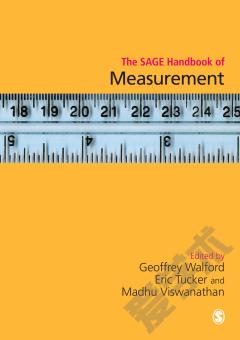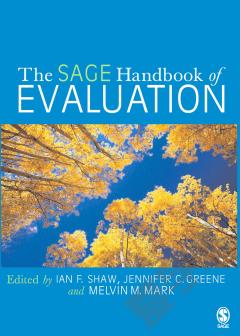The SAGE Handbook of Measurement
Reflections on Social Measurement: How Social Scientists Generate, Modify, and Validate Indicators and Scales - Eric Tucker, Madhu Viswanathan and Geoffrey Walford PART ONE: METHODS FOR DATA COLLECTION Surveys, Tests, and Observational Scales How to get Valid Answers from Survey Questions: What we Learned from Asking about Sexual Behavior and the Measurement of Sexuality - Aniruddha Das and Edward O Laumann The SAT : Design Principles and Innovations of a Quintessential American Social Indicator - Howard T Everson Measurement as Cooperative Communication: What Research Participants Learn from Questionnaires - Norbert Schwarz Developing Observation Instruments and Arriving at Inter-rater Reliability for a Range of Contexts and Raters: The Early Childhood Environment Rating Scales - Elena Soucacou and Kathy Sylva Studying Teacher Effectiveness: The Challenges of Developing Valid Measures - Linda Darling-Hammond, Jack Dieckmann, Ed Haertel, Rachel Lotan, Xiaoxia Newton, Sandy Philipose, Eliza Spang, Ewart Thomas, and Peter Williamson Identifying Consumers' Compulsive Buying Tendencies: Lessons Learned for Measuring Consumer-related Phenomena - Kent B Monroe, Nancy M Ridgway and Monika Kukar-Kinney PART TWO: THE CONTEXT OF MEASUREMENT Comparative, Cultural, Linguistic, and International Dimensions of Measurement Linguistic Factors in the Assessment of English Language Learners - Jamal Abedi Measurement Issues in Cross-cultural Research - A Timothy Church Conceptualizing and Measuring Culture: Problems and solutions - Louis Tay, Sang Eun Woo, Jennifer Klafehn and Chi-yue Chiu International Comparisons of Educational Attainment: Purposes, Processes, and Problems - David Phillips Measurement Across Time and Space Reflections on Measuring Behavior: Time and the Grid - Roger Bakeman Approaches to Measuring Multi-dimensional Constructs across the Life-course: Operationalizing Depression over the Lifespan - Briana Mezuk and William W Eaton Description and Discovery in Socio-spatial Analysis: The Case of Space Syntax - Bill Hillier and Noah Raford PART THREE: FUNDAMENTAL ISSUES IN MEASUREMENT Minimizing Measurement Error Understanding the Intangibles of Measurement in the Social Sciences - Madhu Viswanathan Towards a More Rigorous Scientific Approach to Social Measurement: Considering a Grounded Indicator Approach to Developing Measurement Tools - Eric Tucker Theorisation of Constructs Measuring Conceptualizations of Morality: Or How to Invent a Construct and Measure it too - Remo Ostini The Problem with Poverty: Definition, Measurement and Interpretation - Robert Walker, Mark Tomlinson and Glenn Williams Critical and Ethical Perspectives Ethical Issues in Social Measurement - Martin Bulmer and Josephine Ocloo Measuring is More than Assigning Numbers - Stephen Gorard Is Social Measurement Possible, and is it Necessary? - Martyn Hammersley PART FOUR: THE REAL WORLD PRACTICE OF MEASUREMENT Sensitive Issues and the Difficult to Measure Sensitive Issues and the Difficulty to Measure: The Case of Measuring Child Sexual Abuse - Will Tucker and Ross Cheit Indirect Measurement - David J Bartholomew Improving the Practice of Measurement Increasing the Measurement Accuracy of Consumption Intentions - Brian Wansink Making Applied Measurement Effective and Efficient - Ujwal Kayande Contemporary Challenges of Longitudinal Measurement Using HRS Data - John J McArdle Measuring the Dimensions of Social Capital in Developing Countries - Veronica Nyhan Jones and Michael Woodcock Administrative and Secondary Data and Performance Measurement The Use of Administrative Data to Answer Policy Questions: Secondary Data on Crime and the Problem with Homicide - Marc Riedel Assessing Performance of School Systems: The Measurement and Assessment Challenges of NCLB - Sean Mulvenon
{{comment.content}}








 京公网安备 11010802027623号
京公网安备 11010802027623号